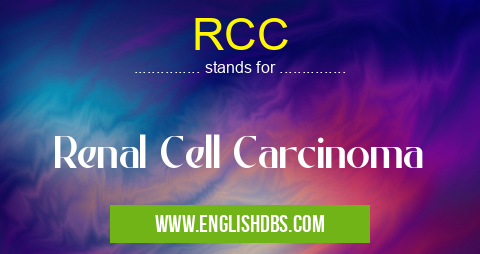What does RCC mean in MEDICAL
RCC stands for Renal Cell Carcinoma, which is a type of cancer that starts in the cells of the kidneys. It is one of the most common types of kidney cancer in adults and can be seen in both men and women. RCC often has no symptoms early on and can be diagnosed based on imaging tests or biopsy taken during surgery when it may be found incidentally. If left untreated, it can grow more quickly and become more difficult to treat, so prompt diagnosis is important.

RCC meaning in Medical in Medical
RCC mostly used in an acronym Medical in Category Medical that means Renal Cell Carcinoma
Shorthand: RCC,
Full Form: Renal Cell Carcinoma
For more information of "Renal Cell Carcinoma", see the section below.
What Is Renal Cell Carcinoma
Renal cell carcinoma (RCC) is a type of kidney cancer that affects the cells that form inside the kidneys' filtering system, called renal tubules. This cancer typically begins as a single tumor, but can spread to other parts of the body if not treated early enough. Symptoms vary by individual but may include weight loss, blood in the urine, fatigue, fever or pain in the side or abdomen. Diagnosis is usually done through imaging tests such as CT scans or MRI scans and sometimes requires biopsies from suspected tumors obtained during surgery. Treatment depends on several factors including stage and size of cancer as well as individual patient characteristics like age and overall health status. Surgery is most often recommended for early stages while chemotherapy and radiation may also be used for later stages.
Essential Questions and Answers on Renal Cell Carcinoma in "MEDICAL»MEDICAL"
What is Renal Cell Carcinoma?
Renal Cell Carcinoma (RCC) is a type of cancer that originates in the kidneys. It develops in the cells of the renal parenchyma, which is the part of the kidney that filters blood and produces urine. RCC is one of the most common types of kidney cancer.
What are some risk factors for RCC?
Common risk factors for RCC include increasing age, smoking, obesity, hypertension and chronic kidney disease. Long-term exposure to certain chemicals may increase risk as well.
Is there a test for diagnosis of RCC?
Yes. If you have symptoms or signs suggesting possible RCC, your doctor will likely order imaging tests like an ultrasound or CT scan to check for tumors in your kidneys. They might also do lab tests or perform a biopsy to confirm the diagnosis.
Are there different types of RCC?
Yes, there are several main subtypes including clear cell, papillary, chromophobe and collecting duct carcinoma. The type depends on how closely it resembles normal kidney tissue under a microscope.
How is RCC treated?
Treatment depends on the stage and type of tumor, as well as individual patient characteristics and preferences. Treatment options can include surgery to remove tumors, chemotherapy or radiation therapy to destroy cancer cells or targeted therapies that interfere with specific pathways involved in tumor growth and spread.
Is immunotherapy an option for treating RCC?
Yes — immunotherapy has become a common approach for treating advanced forms of this cancer by using drugs to boost your immune system's ability to fight off tumor cells instead of directly targeting them with chemotherapy or radiation therapy.
What can I expect after being diagnosed with RCC?
After being diagnosed with this condition, you may be referred to an oncologist who specializes in treating cancers related to the urinary system including bladder cancer and prostate cancer. Your doctor will discuss various treatment options with you depending on your individual case.
Can lifestyle changes help manage symptoms associated with RCC?
Making healthy lifestyle changes such as eating a balanced diet low in red meat and processed foods, avoiding smoking, exercising regularly and getting enough sleep may help reduce symptoms associated with this condition but will not cure it.
Are there any clinical trials available for people living with RCC?
Yes — clinical trials are ongoing research studies evaluating treatments such as experimental drugs or combinations of treatments that may be better than current standard approaches but still need testing among larger groups of patients before becoming widely accepted treatments.
Final Words:
Renal Cell Carcinoma (RCC) can be an aggressive form of kidney cancer with potentially serious consequences if not caught in time. Early diagnosis is best accomplished through imaging such as CT scan or MRI along with biopsies obtained during surgery when indicated. Treatment options depend on individual circumstances but commonly involve surgical resection followed by radiation or chemotherapy depending on stage at diagnosis. With early detection and appropriate treatment, individuals diagnosed with RCC have good prospects for recovery.
RCC also stands for: |
|
| All stands for RCC |
